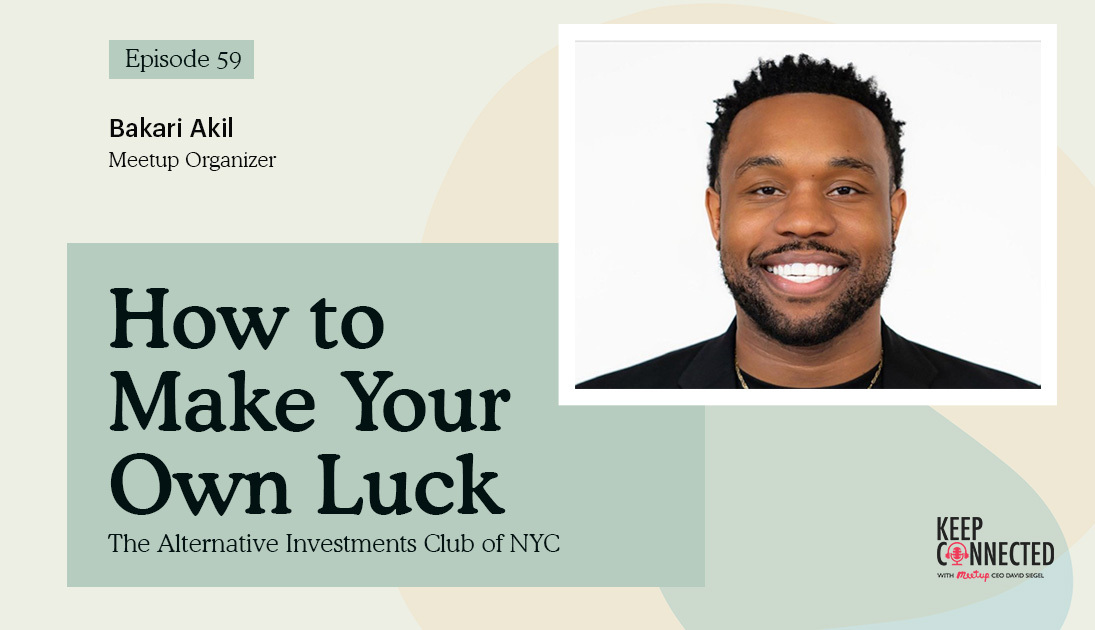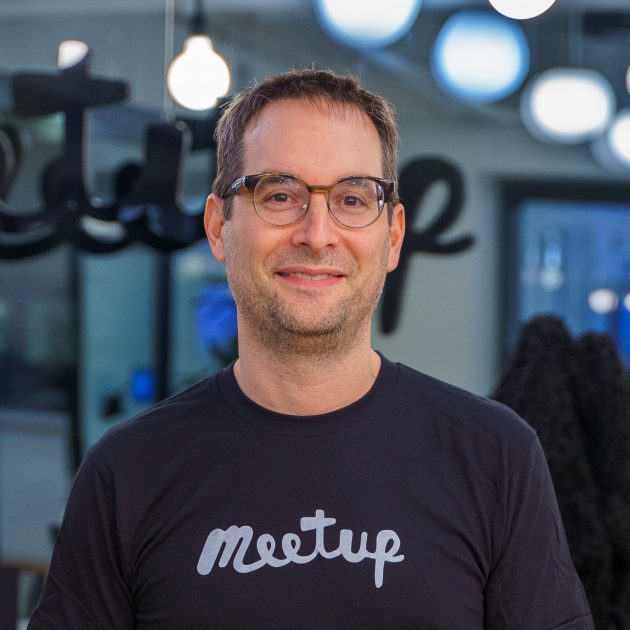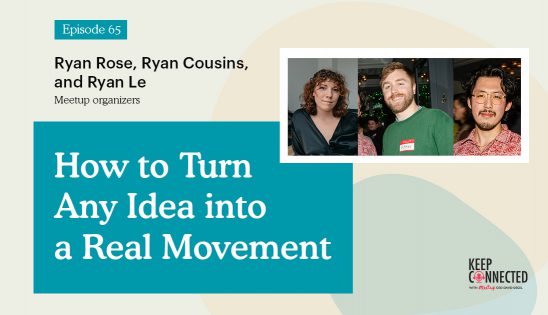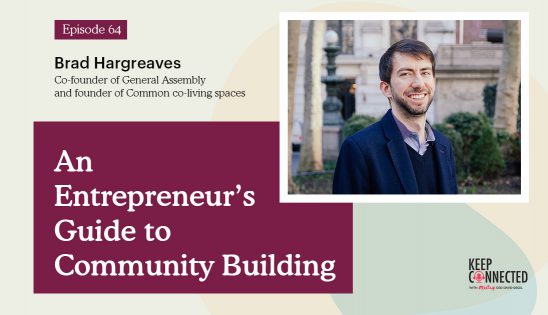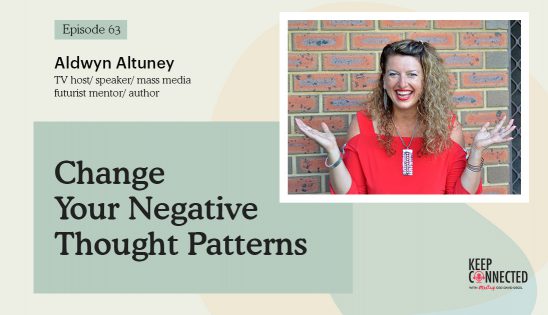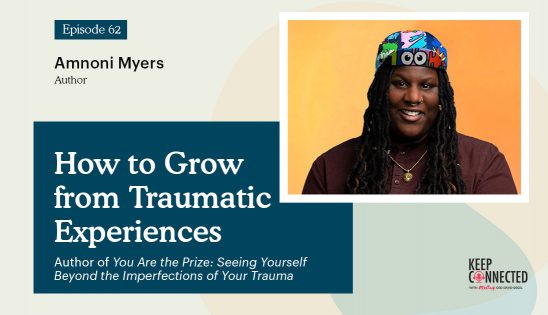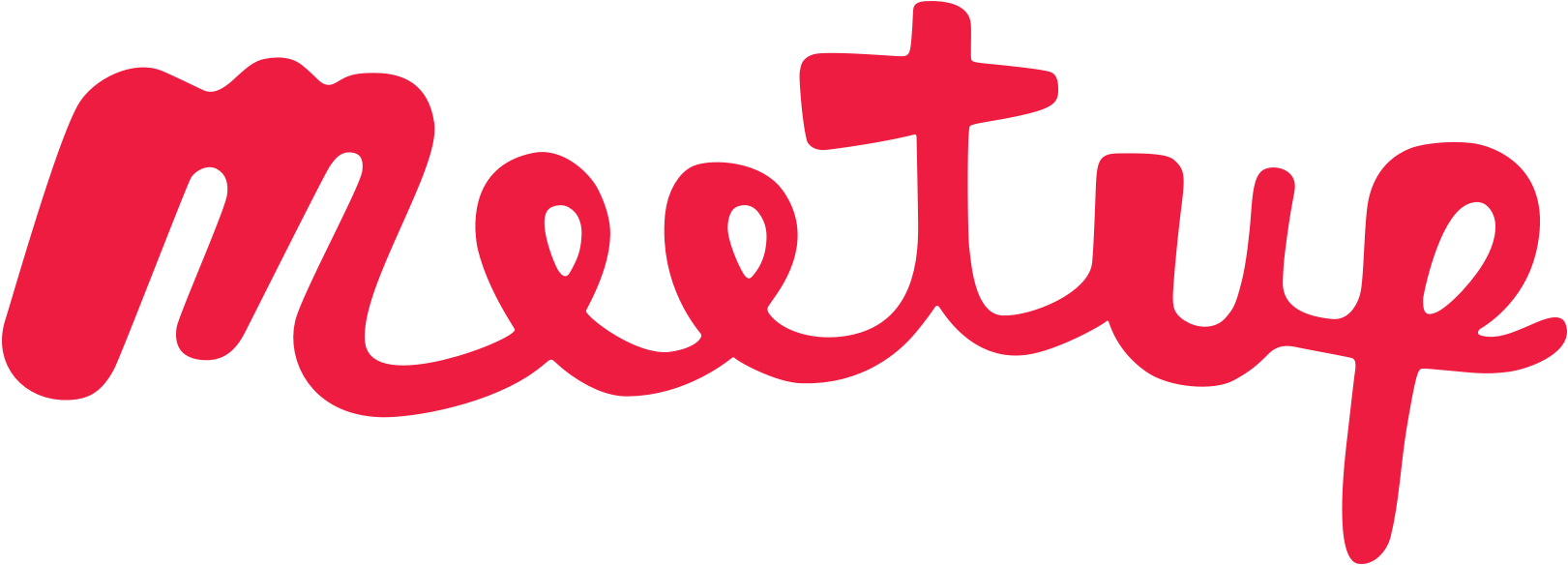Bakari Akil is a self-described scrappy entrepreneur bridging the gap between the corporate world and homegrown success stories. He’s also the organizer of two Meetup groups. His first, the Alternative Investment Club, has more than 5,000 members and is officially the largest private equity and hedge fund Meetup group in the world! Bakari and David sit down to discuss the keys to this club’s great success, as well as how the intense focus on business made Bakari want to lead another community for a more casual connection. That Meetup group, Black People Who Love Being Black, is dedicated to the pure celebration of Black culture through fun outings. Bakari and David’s conversation centers on making your own luck in life by being intentional and being bold.
Show Notes
We have had so many amazing people on this show, from New York Times bestselling authors to Grammy Award singer-songwriters. However, some of the best episodes are when someone cold calls emails and says, “I have read your show and I would love to share my story.” That’s what we’re going to read. We’re going to learn Bakari Akil’s story as a Meetup organizer of two different groups, the Alternative Investments Club and the Black People Who Love Being Black social group. It’s a story around the intentionality and scrappiness of someone who truly cares. Happy reading.
—
Bakari, welcome to the show.
Thank you.
You are clearly a “make it happen” kind of guy. I love when this happens. You cold emailed me and it worked, and you said, “I’m reading some episodes. I’ve been a Meetup member for a decade. I’ve been a Meetup organizer for seven years. You have a weekly Meetup event.” I was like, “We have to have this guy on the show.” It worked.
Thank you.
You organize two different groups. One is a startup fundraising investment group, and the other one’s a social group, Black People Who Love Being Black. Let’s talk about each, talk about one, then the other. You could choose which one you want to do first. Tell me a little bit about why you decided to organize each and start with either.
The Alternative Investments Club is an organization I founded back in 2016 because I had an interest in going out and trying to find a company to buy and run full-time as CEO. I played this game years ago from Rich Dad Poor Dad called Cashflow.
Lots of millionaires have come from playing that game.
From that game, I learned how important it was to see deals on a weekly basis. Not even weekly basis, but on a frequent basis. If anyone has played Cashflow, they understand the goal of the game is that you go around in a circle trying to get out of the rat race. The way to get out of the rat race is to do a good deal or do a bunch of good deals.
At the time, I was 25 and I had never seen a deal, much less any good deals. I created the Alternative Investments Club for two reasons. 1) To try to find a company to buy and 2) To see deals. I invited two camps of people who populate the New York City area. There’s one group of people who are high-wage earners in New York. They work at these major companies.
They got the money.
They have money, but they’re not able to participate in the big deals that Goldman or whoever’s doing. They’re not able to participate because while they have $200,000, these deals are $50 million, and $100 million. They get to participate as an employee in those opportunities. They don’t get to participate as investors or participants other than maybe their stock options or something as a partner compensation.
They have an interest in entrepreneurship. They have an interest in doing that type of thing, and they have the skillset to evaluate those things. Everybody they know who would be interested in doing something like that is working a corporate job. There’s this whole other group of people in New York City who are scrappy entrepreneurs. They are struggling to make it happen. They’re putting all their energy into it, but they don’t know the other group of people.
You were like, “These people should be connected by someone.”
Let’s connect these people. In my opinion, I was a bridge to that. I’m both a high-income earner and a scrappy entrepreneur. I created the Alternative Investments Club to bring that group of people together. From 2016 until the pandemic, every single Tuesday, we would meet at the 40/40 Club. Funny enough, the way I got into the 40/40 Club was very similar to the way I’m on this show.
I set up the meeting and then I went to the 40/40 Club and I said, “I got 50 people coming.” They were like, “We have these back rooms if you’d like to use one.” I was like, “Sure, let’s use the backroom.” The next week I came and I did it again. I showed up and they were like, “We don’t have anything going on Tuesday, so sure you use the backroom.”
It’s almost like the SATs. You get 400 points by showing up, but you seemed to get even more points by showing up. I love it.
I started continued bringing folks to the 40/40 Club and built a good relationship between us and them.
You didn’t have to pay the 40/40 Club anything for that.
Up until the pandemic, we didn’t have to pay. Now, we’re in a new place where we’re trying to figure out what the new dynamic will be. As you know, every restaurant and everybody was suffering. Instead of paying, I would ask people to drop off $20, buy a drink, or something like that to support the venue. In the 40/40 Club rooms, the back rooms, we used the big rooms, the Jay-Z Lounge, which could hold about 70 people. We used that backroom on pretty much every Tuesday for free for years.
One unknown data point is that when Meetup first started years ago, the model used to be that venues paid to host events. It’s not that at all anymore. We don’t get any money from venues, but for the same reasons that you shared. Please continue. Keep going.
Nothing was happening at the 40/40 Club. On Tuesday around 6:00, people would start coming to the 40/40 Club. From 6:00 to 6:30, people were mingling in the Jay-Z Lounge. It’s the typical happy hour type event. There was a decent group of people who hadn’t been to my event before, so they thought that it was going to be like everybody sitting around chatting like that. I didn’t like that type of networking. I felt like it wasn’t deliberate.
At 6:30, I would ask everybody to sit down. At this point, we had probably 50 people in the room and I wanted to give that 6:00 to 6: 30 period for people to get into the space. I learned pretty quickly as an organizer that if I set the meeting at 6:00, people are not showing up at 6:00. People aren’t showing up at 6:15. More likely people are going to show up somewhere in the area at 6:30.
I would have a quorum around 6:30 and say, “I’m the Founder of the Alternative Investments Club. This is basically how it’s going to work. Everybody in this space has the opportunity to get up for 5 or 10 minutes and talk about whatever you’re working on. Introduce us to the business that you’re working on, the real estate deal that you’re working on, or anything that you’re working on that you’re looking to raise capital for. We’re not a space for people who are selling a service. If you’re an attorney, if you’re an accountant, if you’re that type of person, there’ll be space at the end of our event to hop in and talk about that. Right now, we’re exclusively talking about deals.”
Everybody in the Alternative Investments Club space has the opportunity to get up for 5 or 10 minutes and talk about whatever they’re working on.
Over time, I started to realize that, at least in the beginning, people’s pitches were not honed in a way that was giving. In my group, while there were entrepreneurs and investors, there were people who truly did investing. VCs would come by, like legit VCs who ran firms and family offices that had real capital. They showed up in my group, but people were looking for a specific type of information. I realized that there were some people in the space who were scrappy and entrepreneurial but hadn’t done the work of trying to figure out the pitch.
I pulled together this document here that I’m showing you. I would hand it to the presenters as soon as they came up. It was like the mic. If you had this in your hand, then you were allowed to speak. It says, “I’m seeking blank in exchange for blank percent.” You start there and then it has several different questions. What legal structure have you incorporated your investment into? Is your investment a startup, an existing business, or real estate?
How much money did your investment earn in the last twelve months? How long will it take for us to get our money back? How are you going to spend our money? Have you raised any money yet? When was your business started? Those were key questions that I realized over time that people had not immediately set up and had accessible in their pitch for people who wanted to decide whether or not they wanted to learn about the deal.
From that introduction to the event and giving people the opportunity to speak, between then that would be about an hour. From 6:30 to 7:30, people would be getting up round robin and say, “I’m working on a fire hose construction business,” or whatever they’re working on. There would be about 5 or 6 people who would get up at different points and then the room would jump in and interject with questions. An investor who’s in the space who may not be as comfortable getting up and saying something or asking a question might hear somebody sitting right next to them ask the exact question that they want to know. Now the entire room is participating in hearing from everybody in that space.
Did you ever try to track how many investments came from these conversations? It’s hard because you don’t know, but I’m sure you know of a few investments.
I can highlight some that I know about. I know one of my friends met an investor in the space who was not a real estate investor. He had never done a real estate deal and decided to do the deal that he invested $40,000 into a rental property in Pennsylvania. They sold the property. The investor who invested got his money back plus a return. I know specifically about that particular transaction.
I can’t speak all about all of it because ultimately, I was trying to get people to meet one another. In that space, what’s in it for me was that I have 70, 80 entrepreneurs and high-income people in this space. At some point, I would get up and say, “I’m looking for a company to buy. If you know somebody who’s looking to sell a company, let me know. I’d be interested in potentially doing that.” Entrepreneurs tend to come from entrepreneurial families. People would tap me on the shoulder and say, “My dad is thinking about selling his construction business. If you’re interested in construction, let me know.”

You didn’t end up buying a company from that, did you?
I didn’t buy the construction business, but it created a real amount of deal flow for me that was tangible and worth me dedicating the time on a weekly basis to host an event so I can find that company.
Deal flow is one of the most important things for capital. It’s something that many venture capitalists struggle with in trying to get access to those deals. You were getting access to tremendous alternative deals, not just your typical big tech deal.
There are technology businesses that are now a lot larger than I saw back when they were in my space as a 2 or 3-man team pitching to the folks in my space. For me, it’s exciting seeing that development and growth. The way I would wrap up the event and this is what, in my opinion, made it different than most other events. I hope somebody who’s reading this would replicate this and do this in another city. This is important in terms of the way to create real meaningful networking. At the end of the event, everybody in the room would get up for two seconds and say, “This is my name, this is what I do, and this is what I’m looking for.”
Let’s say there are 40 or 50 people in the space. That’s a good fifteen minutes of everybody popping up. Regardless of who’s in the space, who may not have gotten a chance to pitch, everybody’s heard from everybody. As a result, you walk out of the space, and you’re like, “I didn’t know that was an attorney over there. Let me go talk to that attorney. Let me go speak to that guy in that space in real estate. I didn’t know that person was here in the space.”
Everybody got a chance to hear from everybody. The final thing I did as people were leaving, I would collect everybody’s contact information and let them know, “This is what I’m going to do with it.” I would email every single person who was in the group with the sheet that I collected of everybody’s contact information, which included a description of what they do.
It added to the levels of when you get back home, you look back at the sheet and say, “I meant to talk to that person, but I didn’t get their contact information. Luckily, I have this sheet with everybody’s information on it.” I did everything I possibly could to take the guests and the loss of opportunity away from people. People still, to this day, reach out to me and say, “I came to your event back in 2018. There was this guy I was looking for. Can you send me the sheet from that event? That was the day I came there,” and I can check my records and send that off to them. That’s the final way that I handled that.
Intentionality is so important. People oftentimes say, “I got lucky.” Oftentimes, luck is hard work. It means being very intentional. If your networking is a game of darts and throwing a lot of things against the wall, you get lucky and maybe you meet someone. I love how intentional you made it to be able to get people to find the right people and connect.
I bet what ended up happening after that is a whole bunch of lingering after the event. I always say that the best Meetup moments are the lingering in the parking lot, the hallways, a doorway, or the bar afterwards. That’s where real connections oftentimes happen. I wouldn’t be surprised if people hung out 30 minutes, 1 or 2 hours afterwards in that location. Other locations too.
That’s exactly what we saw. We closed out our event roughly about 8:00, so starting from 6:00 to 8:00, but we’re in the 40/40 Club. It’s a beautiful place. Plus, you now know so much about the people who are in the space. It’s not like you’re having to walk up and say, “What do you do?” You heard that person say what they do. You know exactly what they do. You can start the conversation straight up from that. I did a lot to make that. I would say most frequently, we didn’t leave and close out until around 10:00.
Two hours later. That’s important, by the way, for our audience to hear because oftentimes, when people think an event’s over or ends, they leave. Sometimes the absolute best part of an event is the post-event time. Thinking through how you can maximize that time for real meaningful conversations is something that you institutionalize. A lot of events don’t do that. I encourage people to find ways to do that. I want to hear next about the Black People Who Love Being Black social club, how it started, what you want to do with it, and what your goals are.
One of the things that I like about Meetup is that every once in a while, an organizer will say, “I’m moving. I’m leaving town. I don’t have the interest or the passion for organizing this group anymore.” I’ll open up the option for other people who are members who want to organize the group.

About 30% of groups that someone wants to end, end up having someone that wants to step up and take over.
For me, that’s a valuable tool because it allows me to launch off of an already existing platform of users and members and an organization that already has a culture to it. I come from the world of buying businesses. I’m already predisposed to things that have already existed and have years of data behind them. I can look back and see what members enjoyed and what they didn’t like and use that to try to determine what I’m going to do in the future.
That’s how I became the organizer of Black People Who Love Being Black. I wanted something social that was unconnected to my business world. I noticed that a lot of my life had been dominated by buying companies, which I do now, and all of that business stuff. I wanted to hang out with like-minded people who enjoy being Black. That’s it.
When this opportunity came up, I wasn’t anticipating that it would pop up, particularly with this group, because that had been around for so long. It’s one of the oldest social clubs of its type on Meetup. When the opportunity to become an organizer came up, I took over the group and then I didn’t do anything for it for a period of time because I wasn’t certain of what to organize.
Every once in a while, I would organize something and I noticed only a couple of people would RSVP. I would look backwards and there had been a time when 50 or 70 people were RSVPing. I was like, “What is the difference between what I’m doing and the way this is happening?” I realized that there was at least some part of this where I was going to have to step out of the Meetup platform and invite people to the Meetup platform
To re-energize it.
Years ago, I hosted a birthday party for myself and I asked a lot of my friends to give me their email addresses. I didn’t want to do it via text, so I did it via email. I had a platform similar to like MailChimp that allowed me to send out mass emails. Text is not the easiest for doing that mass thing. I’ve got everybody’s email address and I had a list of maybe 300 people.
My Meetup group had 4,000 people in it, but I needed to energize that group so that they would look at it and say, “It’s more people.” These are people who knew me personally. I sent them the message. I played basketball at Equinox, have a lot of friends from my Equinox group, and invited a lot of those people. Once it hit twenty people who had RSVPed, that’s when the tipping point happened. A lot of people who hadn’t been active on my Meetup page at all started popping in.
They see, “Three people are going. I don’t want to go to that event. Cool, 30, 40, or 50 people are going. Now, I’m interested.”
It went crazy. I was hosting game night at my house and I have a two-bedroom apartment.
Were you playing Cashflow or not?
No, I didn’t. That’s a great point. What I did was I went to X & Co and I said, “Give me all the games that when somebody walks in, they would expect to see that game at a game night.” I got Jenga, Monopoly, Connect Four, and Scrabble. I live in a two-bedroom apartment. It’s pretty big. I was worried because it hit 100 RSVPs. This is after scheduling different events and only 7 or 8 people RSVPed. Now we’re at 100. I have friends hitting me up like, “Can your place hold 100 people?” I started to suspect two things were likely going to play out.
Only half the people would show up. That helps.
Second, half of those people are not going to show up at the exact same time.
People come late. They leave early.
I’m happier with the larger RSVP and I think I can deal with that. I sent the message over to my landlord and said, “I’m having a game night at my house. I want you to be aware that there are some people coming.” At the height of my party, there were probably around 45 people total in the apartment. It never got uncomfortable. It went pretty well.
Since then, I hosted a Super Bowl at my house and a lot of people came for Rihanna’s performance. It was funny. There were so many women who came to my apartment. There were a decent amount of guys, but so many women who came to my apartment for the Super Bowl. As soon as Rihanna finished, that was it. They’re like, “This is so great. Thank you so much.”
Super Bowl for half of America is just the halftime show.
That was a fun experience. Now, we’re doing a book club.
I assume it’s a book club related to Black culture or Black history. What’s the book?
We’re reading Kindred by Octavia Butler, which was a Hulu show.
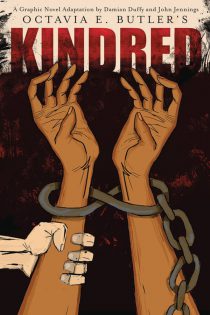
It was easy to cheat and watch.
That’s exactly what I said. I said, “You don’t have to read the book, but you could watch the show.”
The theme between both of these is an incredible amount of scrappiness. It’s the story of your life in certain ways as an entrepreneur and building things. You could probably give a lecture on what it means to be scrappy. What are the traits that are important? How do you approach being scrappy? I have to ask because it’s something that you clearly excel in and I want to learn. Share anything you can about scrappiness and why people are not scrappy enough, etc.
I don’t know how to not be scrappy. My advisor at Columbia Business School invited me to be a lecturer in his group. He loves to tell the story. That’s his favorite story to tell. He was a professor at Columbia Business School and he taught the subject about buying companies. I was not a student at Columbia Business School. I lived in Harlem. I learned online that he was teaching this class and I needed to learn this information. I didn’t know any other way to learn this information. I went to the class and sat in the class.
Instead of paying $10,000 on average per class, you were like, “I can show up.”
They were right there in Harlem. It’s not like the building was locked. I was like, “I’ll go sit in the class.” I sat in the class for most of the semester.
Did he know you weren’t a student?
No.
How big was the class?
It was like 40 to 50 people in the class.
You’re showing up and not doing anything.
I tried to sit. For MBA programs, there is a lot of assigned seating, so I sat wherever I didn’t think that was an assigned seat.
This is scarier than going to a football game and trying to move a couple of rows down.
Eventually, I introduced myself to the professor towards the end of the class. He was so impressed by the fact that I would come to the class. Going forward for the next three years, as he taught that class, he would always call me in and say, “Do you know how I met this guy?” I would come in and speak about my experiences trying to do this hard thing of searching for and acquiring a business.
Do you think to yourself, “What’s the worst that could happen?”
That’s basically right.
What could happen? He could say, “Get out of my class.” By the way, if you’re not allowed in the class, it’s the same thing if you didn’t go to the class in the first place.
I got the idea from Steve Jobs. During his Stanford commencement speech, he talked about how when he dropped out of school, he was in a position now to take any class that he wanted. I was like, “That’s an absolutely true statement.” When the opportunity came, I took advantage of it. I don’t know how to do things without looking for an opportunity to be scrappy. For me, it matters if I’m trying to learn something, I need something, let me be creative and get it done.
If I need something, let me be creative and get it done.
Why aren’t more people scrappy and say, “I’m going to show up. What’s the worst that can happen?” Obviously, fear, anxiety, etc.
In my case, I guess the real downside to somebody is the feeling of being embarrassed. It’s this idea that the professor might at some point say, “Who is that?” The entire class looks back and says, “I do not know this man.” That feeling of being embarrassed or humiliated is probably the thing that scares most people from doing things that are harder. I could have brought 50 people to the 40/40 Club and the 40/40 Club said, “Turn around and go home.” That was an absolute possibility. To me, it was unlikely. The 40/40 Club as an incentive. They want to have people in that space. I didn’t expect us to get the free room. That was a bonus.
I knew that they would host us. I knew they would, on a Tuesday night when nobody’s there, be willing to host us. Worse come to worse, I didn’t feel like people were going to lose anything. If they came to the 40/40 Club, we got a chance to all meet up and maybe we walked to a different bar. There was no true harm and it was only a real opportunity. That’s the reason why I went.
You’re thinking about it from a cost-benefit standpoint and you’re saying, “What’s the benefit? Significant. What’s the negative? Fairly minimal. Let’s do it.” Anyone who’s reading this right now, most of you have heard Steve Jobs’ commencement address, because it’s one of the most famous viral videos ever, but if you have not heard it, then I encourage every person here to listen to it. It is what Bakari is referencing as well and an incredible motivation for so many different people across many different things.
I have to tell a quick story, which is related to you having two groups. I’ve spoken with an organizer in San Mateo, California. He told me that he has two groups. One group is a bowling group and he did it because he loves bowling. He loves hanging out bowling. The other group he has is a career progression networking group, a business group, etc. He did it to find a job and help himself and his career. He said, “I have to say this, I got in my last two jobs from my bowling group, and I met my best friend at the career networking group.”
What I love about that story is it’s the business side, which is your ultra investing club, and the social side, which is your other group. The overlap that can exist between those two and how amazing relationships can develop from an investing club and how career opportunities can come out of the Black People Love Being Black club. Have you seen that? Have you seen that juxtaposition?
I’ve been running the Black People Meet club for less time. I’ve been the organizer for about a year, but I only started hosting events after about eight months. Thus far, the social side of the Black People Meets club has taken the front of that side. It’s still mostly career side on the Alternative Investments Club. That said, for years, I was only the Organizer of the Alternative Investments Club and met a lot of close friends. They had a lot of good experiences. My actual attorney is not just my attorney. He’s my friend. I met him through the Alternative Investments Club. That’s similar to a lot of different people who I’ve met through the Alternative Investments Club. There’s an overlap between both our social lives and our professional lives.
One of the things people don’t realize is that sometimes the best networking or way to build relationships is to show up. Go to something that you’re interested in and you’re passionate about, whether it’s culture history and identity, or whether it’s investing and you never know what’s going to happen. Magic will happen when you show up.
When I first got to New York, that was like the main way I would go out. I used to go to a Meetup group for improv classes then I would see different tech Meetups. There were lots of different Meetup groups that I would attend until before I became an organizer.
It was hard to go from a member to an organizer. About 80% of our organizers are previously active members. It’s a path. A lot of people like going to parties, but not a lot of people necessarily like throwing parties. You’re a throw-a-party kind of guy. Weren’t you beforehand? Weren’t you an invite-100-people-over-your-two-bedroom kind of guy before?
I will try. The first time I became an organizer, I tried to organize a group and one person came. For me, that was demoralizing. I’ve seen other Meetup groups go from 1 to 10 to 15 to 20. I knew if I stayed consistent with it, that was likely the outcome. For me, it felt like a grind that I wasn’t ready to do if I was going to start from zero. I’ve looked for opportunities to take over existing Meetup groups.
At the time, I didn’t know that was a real thing. In fact, I thought there was a little bit of an imposter problem with that. I used to think when I first joined Meetup when somebody would say, “Do you want to step up as an organizer,” that if I did, everybody in the group would say, “Who is this guy?” It took years for me to feel the confidence to say, “I’ll step up as the organizer and take over this group.”
You are the ultimate growth hacker in life and in business. I love it. That’s a total compliment to you. Rapid-fire questions, rapid-fire quick answers, here we go. The first time, Bakari, that you saw yourself as a leader.
I’m not sure I see myself as a leader now. I want to be, though, so I’m still working on it.
Next one. If you could access a time machine, and go anywhere at any time, where do you think you would go?
My instinct is to go get the Sports Almanac out.
A little Back to the Future. Spoken like a true entrepreneur. Name one thing on your bucket list.
I’m in early conversations right now with a group called Remote Year. It’s an organized group of 40 or 50 remote workers who travel around the world for a month at a time. They live in different countries for the entire year. I’m in the early talks with Remote Year about going on a world tour with them and working remotely.
I wonder how to navigate Meetup in that context. I know Meetup is an international organization. There might be groups out there that I’ll be able to engage with and connect with while I’m out there. Right now, that was the thing that was on my bucket list. It was the goal of traveling the world. I’m fortunately in a position financially and professionally where I can take that time to do it. Ideally, I hope to be able to pull that off by the summertime.
What an amazing experience. We have over 40% of RSVPs to Meetup events happening outside the US. We’re in 200 different countries. I am confident you’ll find many Meetup events when you’re in your Remote Year, which is what an amazing life experience. The last question is, what do you most want to be remembered by?
I would hope to be remembered. I want to do something. I don’t know what that thing is yet, but I’d like to do something in the future and near future. A hundred years from now, people will say, “Bakari was cool. Remember what he did? That was dope.” That is what I’m working on now.
A hundred years from now, people will say, “Bakari was cool. Remember what he did? That was dope.”
I’m confident that will happen. You are doing so many different things and each of those things presents tremendous numbers of opportunities. You look to be a source of good and connecting and helping others. Thank you so much for being on the show. I enjoyed the conversation. Thanks for reaching out. What would happen if you weren’t scrappy and reaching out? Have a good one.
Thank you very much.
—
Thanks for reading the interview with Bakari Akil. I hope it was a good alternative investment of your time. One of the things I loved about the conversation is how intentional Bakari is around relationships, connecting people, and helping people. His tenacity and scrappiness are things that everyone can learn from. If you enjoy this episode, then please subscribe. Leave a review. Check out my new book, Decide and Conquer, and remember, let’s keep connecting because life is better together.
Important Links
- Bakari Akil
- Alternative Investments Club
- Black People Who Love Being Black
- Rich Dad Poor Dad
- Cashflow
- Kindred
- Remote Year
- Decide and Conquer
Mary Garcia (she/her) is Meetup’s Content Manager and editor of the Community Matters blog. When she’s not writing, Mary organizes a swamp fiction book club on Meetup. Find her on LinkedIn.
Last modified on April 3, 2023

